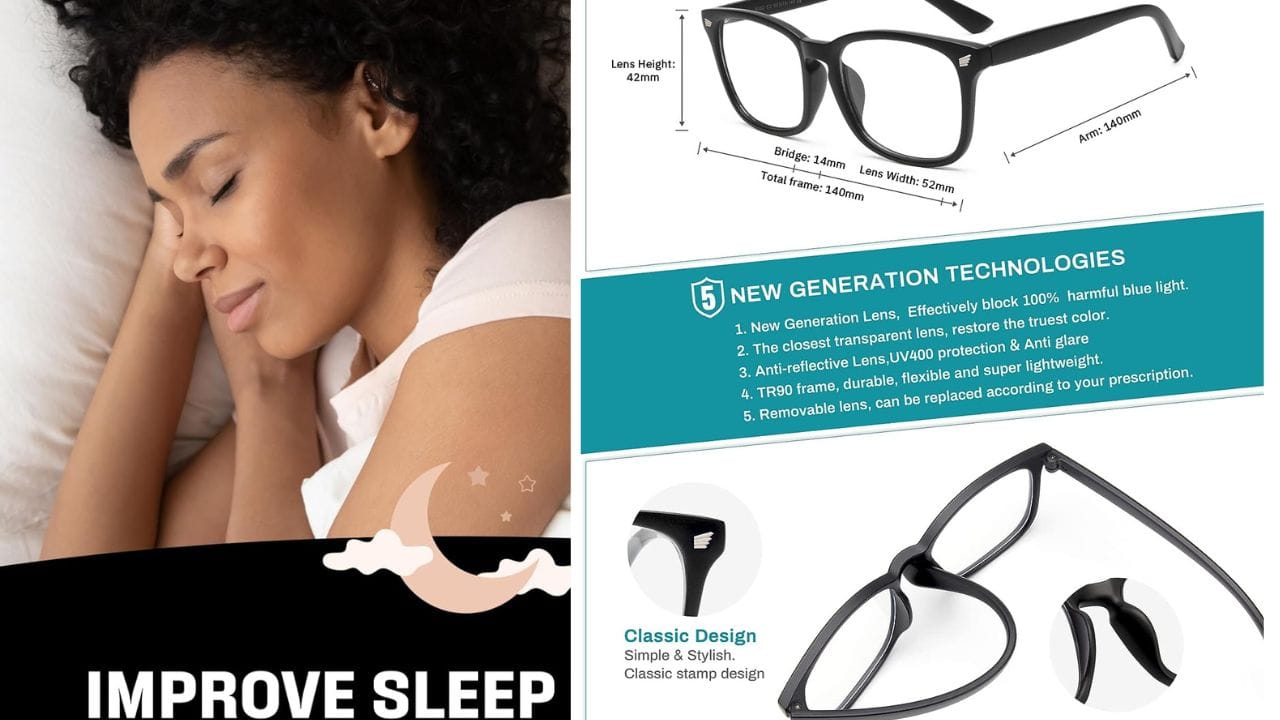Can Blue Light Protection Glasses Improve Your Sleep Quality?
Say “goodbye” to restless nights and “hello” to rejuvenating sleep, courtesy of Blue Light Protection Glasses!

Key Takeaways:
- Blue Light Protection Glasses may help regulate your sleep cycle by blocking blue light emitted from screens.
- Wearing these glasses could potentially lead to better sleep quality by reducing eye strain and preventing sleep disruption.
- It's important to combine the use of Blue Light Protection Glasses with good sleep hygiene practices for optimal results.
In today's digital age, screens are an inescapable part of life. From the moment we wake up to the time we go to bed, we're bombarded with the glow of digital devices. This constant exposure to screens, especially before bedtime, has raised concerns about the impact of blue light on our sleep quality. Enter Blue Light Protection Glasses, a product that claims to shield our eyes from the potentially sleep-disrupting effects of blue light. But do they really work? Let's dive into the science behind these glasses and see if they can truly be a boon for your bedtime.
The Science of Blue Light and Sleep
Before we can understand how Blue Light Protection Glasses might benefit us, we need to grasp what blue light is and how it affects our sleep. Blue light is a type of light with a short wavelength, which means it is high-energy. It's naturally present in sunlight, which helps regulate our sleep-wake cycle, or circadian rhythm. However, the blue light emitted from screens is much more concentrated and can disrupt this natural cycle, making it harder to fall asleep.
How Blue Light Affects Your Eyes
Staring at screens for extended periods can lead to digital eye strain, characterized by dry eyes, irritation, and difficulty focusing. Blue light contributes to these symptoms because it scatters more easily than other visible light and is not as easily focused. When you're trying to wind down for the night, battling eye strain is the last thing you need.
The Role of Blue Light Protection Glasses
Blue Light Protection Glasses are designed with lenses that filter out blue light. The idea is that by blocking this light, you can minimize its negative effects on your sleep. Some users report that wearing these glasses in the evening helps them fall asleep faster and enjoy a more restful night's sleep.
Are All Blue Light Glasses Created Equal?
Not all Blue Light Protection Glasses are the same. Some have a yellow tint, while others are clear, but they all claim to filter out varying degrees of blue light. It's important to research and choose a pair that has been independently tested for effectiveness.
The Impact on Sleep Quality
Anecdotal evidence suggests that many people who wear Blue Light Protection Glasses in the hours leading up to bedtime experience an improvement in sleep quality. They report feeling more rested and having an easier time falling asleep. However, scientific studies on the matter are still ongoing.
Combining Glasses with Good Sleep Hygiene
While Blue Light Protection Glasses may offer some benefits, they should be used as part of a broader approach to good sleep hygiene. This includes maintaining a regular sleep schedule, creating a restful environment, and avoiding stimulating activities before bed.
What Experts Say
Sleep experts often recommend limiting screen time before bed as part of good sleep hygiene. For those who cannot avoid screens, Blue Light Protection Glasses might be a helpful tool. However, experts also emphasize the importance of managing overall exposure to blue light throughout the day.
Real-Life Success Stories
There are numerous testimonials from individuals who swear by their Blue Light Protection Glasses. They often share stories of improved sleep patterns and a noticeable reduction in eye strain after regular use.
Potential Placebo Effect
It's worth considering whether some of the benefits of Blue Light Protection Glasses could be attributed to the placebo effect. Believing that the glasses will help could lead to a better sleep experience, regardless of the actual impact of the glasses.
The Verdict from Research
While research is still catching up with the popularity of Blue Light Protection Glasses, some studies have shown that they can indeed reduce the amount of blue light that reaches the eyes. However, the direct correlation to improved sleep quality is still being explored.
When to Wear Blue Light Protection Glasses
For those interested in trying out Blue Light Protection Glasses, it's recommended to wear them during the evening hours, especially if you're using electronic devices. This can help prepare your body for sleep by reducing blue light exposure.
Other Ways to Reduce Blue Light Exposure
Aside from wearing Blue Light Protection Glasses, you can also reduce blue light exposure by using screen filters, adjusting the settings on your devices to emit warmer tones, and making sure to get plenty of natural light during the day.
Making the Right Choice for You
Ultimately, whether or not to use Blue Light Protection Glasses is a personal decision. If you're struggling with sleep and spend a lot of time on screens, they might be worth a try. Just remember to consider the quality of the glasses and to maintain other good sleep practices.
Can Blue Light Protection Glasses Improve Your Sleep Quality?
Blue Light Protection Glasses have become a popular solution for those looking to improve their sleep quality in our screen-saturated world. By filtering out blue light, these glasses aim to protect our eyes and prevent the disruption of our natural sleep cycle. While there is some evidence to support their effectiveness, it's important to use them as part of a comprehensive approach to sleep hygiene.
Real-life success stories and some research suggest benefits, but individual experiences may vary. If you're considering Blue Light Protection Glasses, click the button below so that you may choose a quality pair and combine their use with other strategies for reducing blue light exposure.

